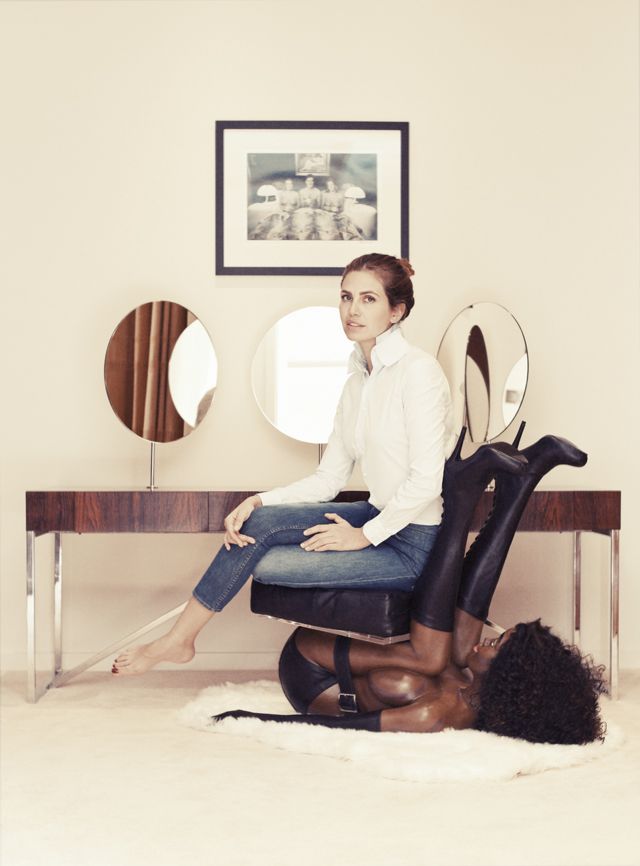Black Woman Chairs and Recurring Racism in Fashion

by Lyndsey Ellis
As America honored what would’ve been Dr. Martin Luther King’s 85th birthday on Monday, one incident threatened to spoil the moment. An online magazine called Buro 247 published a story about Garage Magazine’s Russian editor-in-chief and socialite, Dasha Khukova. The article’s photo showed Ms. Khukova sitting on a chair designed to emulate a topless black woman donning long gloves, hot pants, and go-go boots.
The result was a social uproar from the media, people of color, and their sympathizers. When looking at the viral storm, I can’t help but want to explore certain aspects that stood out to me.
Why the Black Mannequin?
Other than the irritating comparison to Stanley Kubrick’s sexualized female props in A Clockwork Orange, one point that keeps coming up is that Norwegian artist Bjarne Melgaard’s chair also comes in white woman. It’s this hypothetical way of thinking that helps some people deal with the unsettling reality of blatant racism and misogyny that still exists in pop art and fashion.
Nevertheless I’m curious about the reason for choosing the black woman chair over the white woman chair. Not that either seems more tasteful and less antagonizing than the other, but it would be interesting to know who or what influenced Ms. Khukova’s, or her editorial team’s, decision.
There’s a chance someone thought it was a good idea to take on the whole notion of contrasting images in art. Porcelain white vs. jet black, fully clothed vs. half naked, bored and comfortable vs. stiff and constrained. Whatever the case, the magazine failed to take into account the impression it would make on women of color.
The Public’s Wrong Reaction
Buro 247’s concern with making the right social statement completely backfired. Instead of getting the abstract response intended, the majority of reactions were visceral. Keep in mind this comes after a long history of racism in the fashion industry, most notably witnessed in the blackface Instagram trend that swept over the Internet at the end of last year. Established models like Naomi Campbell and Tyson Beckford also helped drive the point home by recently addressing the lack of diversity in the field.
Apparently, the pattern in pop art isn’t far behind. Ms. Khukova’s written apology stated that Melgaard’s art was merely a reinterpretation of British pop artist, Allen Jones’s, work that explored gender and racial politics.
This raises several questions. After seeing the photo, were women of color expected to nod in silent approval? Were we out of line to take this out of context, especially when we’re routinely confronted with oppressive views and images of ourselves through music, films, and other commentary here in the United States? Is our own culture’s tendency to influence the poor perception we sometimes have of ourselves supposed to make us see Ms. Khukova’s picture in a different light?
I’ve also read commentary about the image proposing that black women are like furniture because
we’re so often viewed as being supportive. But, I find it difficult and unnerving to believe Ms. Khukova would expect any woman to take this as an international term of endearment.
And, then there’s those who’ve said the picture serves the interests of S&M fanatics. In my opinion, there’s nothing cute, sexy, or even kinky about a half-naked black woman in distress. So, if that’s the case, there’s no way we should feel flattered that Buro 247 decided to put us at the center of this community’s arousal.
I urge Ms. Khukova to put herself in the mind of a black female and consider her initial gut reaction. Regardless of anyone’s so-called intentions, it’s not 1969 anymore; Jones’s political standpoint comes secondary to our dignity as women of color. Secondly, we’re not impressed with this sadistic fetish of commodifying black women and holding them in bondage. And, as far as I know, most of us are plain tired of being seen as a stoic support system to everyone. We’ve had enough; be your own rock.
The Aftermath
Although Buro 247’s eventual cropping of the controversial photo and Ms. Khukova’s public apology was quite predictable, I question the reason for not standing behind what initially seemed like a fearless position. Still, regret and repentance are clearly two different things. The statement (which was issued the day after the photo went viral) didn’t feel apologetic at all. It seemed loose and carefully worded to imply that those of us who felt offended were responsible for our own over-sensitivity.
Let me be the hypothetical one this time. Suppose someone stepped on Ms. Khukova’s foot, turned around, and apologized? On the other hand, what if they said they were sorry that she felt like she had to scream ‘Ouch!’ when she knew it wasn’t their intent to step on her foot?
On a larger scale, I can’t fathom anyone kidnapping Ms. Khukova’s ancestors years ago to work for them as their property with no compensation. After giving them freedom, they continue reminding them of their inferior social status with vulgar images and actions.
Women of color deserve an apology filled with genuine remorse—one that leaves us entitled to feel the pain inflicted—and not Ms. Khukova’s way of saying she’s sorry for our ignorance of the context. The last thing we need is another apology for our inability to understand the art of good business and refusal to get over it or move on.
If I had the chance to talk directly to Ms. Zhukova, I’m not sure I’d get much more than a new rendition of her initial statement on this matter, in terms of her pleasure to remix concepts. I can only hope that what she’d say would be sincere and reveal how the last couple of days have affected her decision to be more careful next time.
In truth, we aren’t whining; we’re hurting. This pain comes from the social scab that keeps being torn off of a wound that can’t heal. To my sisters and brothers of color, let’s continue to hold ourselves, as well as other cultures, accountable for the negative ways we’re presented at home and abroad.
Related:
Elle Editor in Blackface Shows How Little We Should Expect from Mainstream Magazines
Lacking a Reflection: The Homogeneity of Images of Beauty within the Fashion Industry
Africa In Vogue: The Exploitative Practice of Selling Culture

No comments: